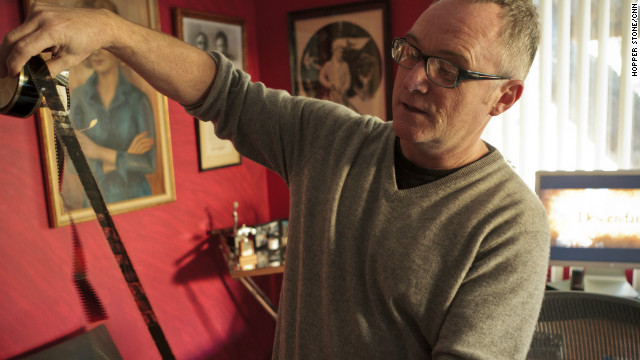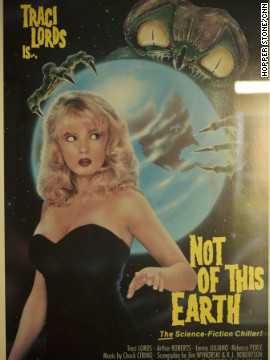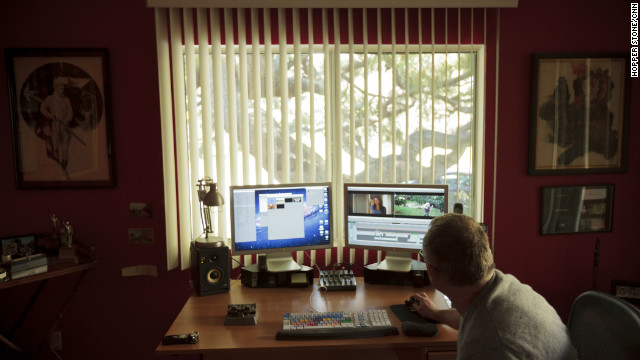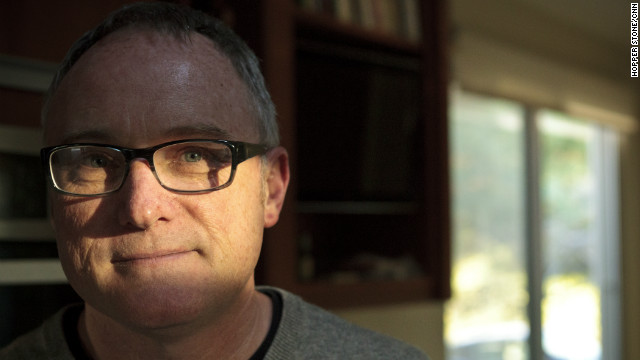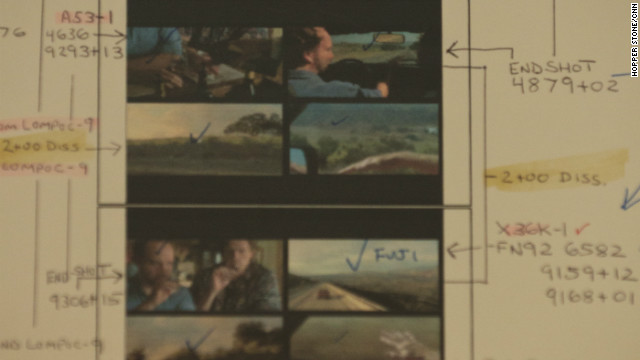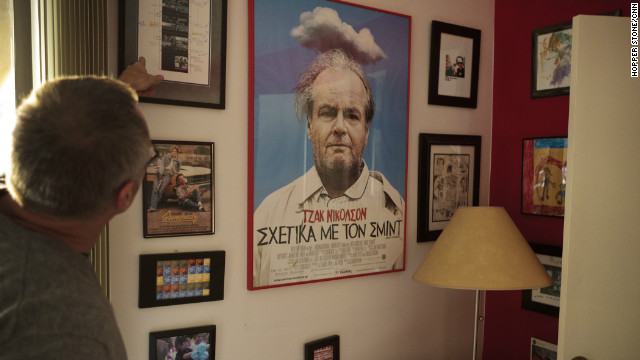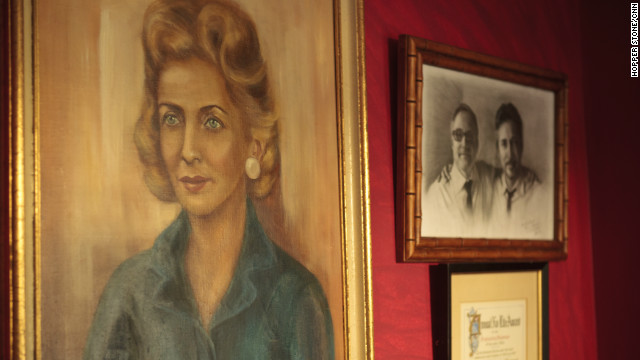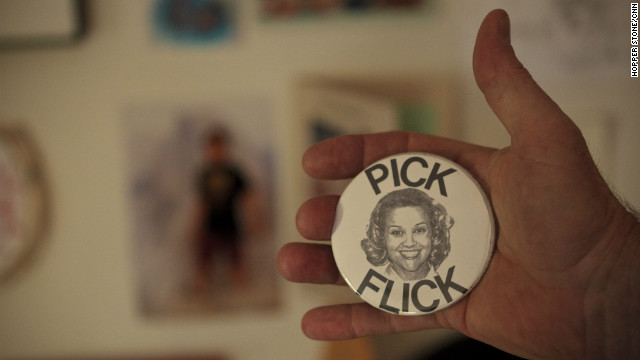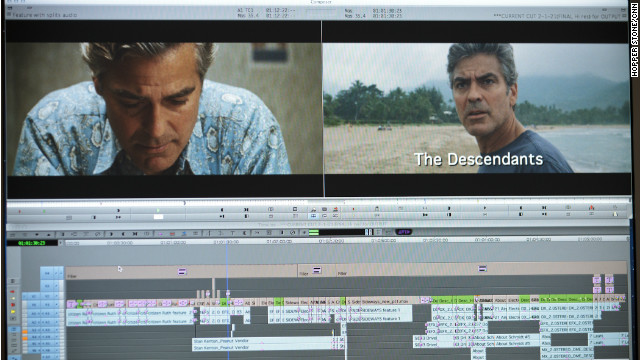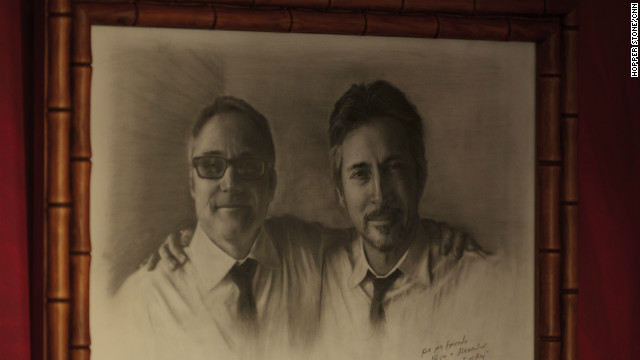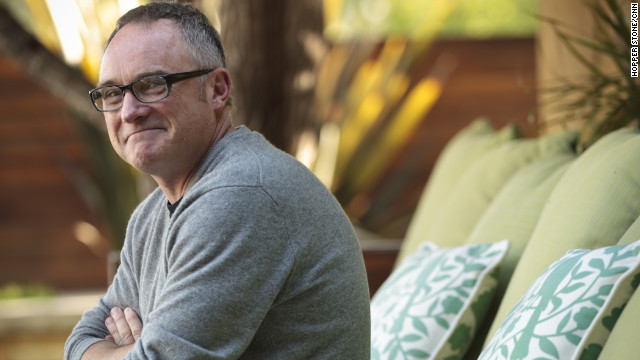- Film editor Kevin Tent is up for an Oscar for "The Descendants"
- Tent has edited all of director Alexander Payne's films
- The relationship between a film editor and director is "like a marriage," says one observer
- Film editing makes sense of story, director's vision; it's "the last rewriting process"
Editor's note: This is part of a look at some of the lesser-known Oscar nominees. Read Q&As with "Margin Call" writer J.C. Chandor, "Dragon Tattoo" cinematographer Jeff Cronenweth and "Artist" costume designer Mark Bridges.
Los Angeles (CNN) -- From a wall in Kevin Tent's home office, Mrs. Cohen stares out into the room.
The place is neatly decorated with memorabilia from the film editor's life and career: a "Pick Flick" button from "Election." A Greek poster for "About Schmidt." A promotional handout for the 1992 Drew Barrymore crime drama "Guncrazy." A space shuttle crew photo (a high school friend was on board). A flyer for his homemade root beer. Posters, photos and knickknacks, whimsical and unpretentious, including an old roll of film, the movie poster for the schlocky "Not of This Earth" and some small trophies.
And then there's the all-seeing Mrs. Cohen.
She's mounted on the wall, this slightly offbeat painting of an imperious 40-something woman. Her arms, with their overlong fingers, are folded tightly against her blue dress; her eyes miss nothing. Tent, who's worked on every film directed by Alexander Payne, claims that the eyes "kind of follow you." He brings her to pretty much every editing room he's worked in, in a variety of locations, over the past 15 years.
One wonders what she would make of her journey with the upbeat editor who bought her one day in Harrisburg, Pennsylvania.
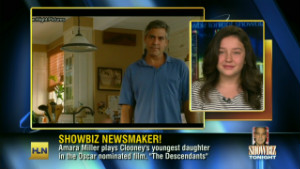 Co-star of 'The Descendants' speaks out
Co-star of 'The Descendants' speaks out
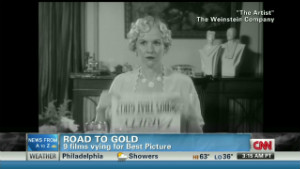 'The Artist,' 'The Help' go for Oscar
'The Artist,' 'The Help' go for Oscar
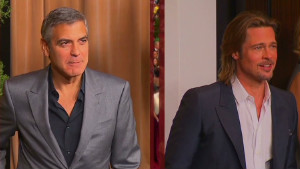 Friendly competition for the Oscars
Friendly competition for the Oscars
At the time, Tent was editing "Girl, Interrupted." His cutting room was in the mental hospital where the film was being shot, and he decided the barren space needed some color. On a lunch break to look at art, there she was.
"I found her ... or she found me," he recalls. "The guy in the shop told me she had hung over the fireplace at the Cohen home for years. When she passed away, none of her kids or family wanted the painting."
Perhaps Mrs. Cohen will soon belong to an Oscar winner. Tent is up for an Academy Award for film editing. It's one of five Oscar nominations received by "The Descendants," and it's Tent's first nod for the big prize.
Tom Charity: Oscar winners, losers, omissions
The painting has long been a source of amusement. Visitors inevitably ask about her; during "Sideways," an assistant took her to a Hollywood Boulevard fortune teller for a reading.
But perhaps she touches a deeper nerve. Payne's movies are invariably tragicomic portraits of human beings, full of humor -- drunk-dialing Paul Giamatti in "Sideways," bee-stung Matthew Broderick in "Election" -- alongside pain: bereft Jack Nicholson in "Schmidt," pondering his suddenly lonely home; George Clooney in "The Descendants," finding out his comatose wife has been cheating on him. Mrs. Cohen may seem tough on the surface, but what's behind those icy blue eyes? She sounds like she could be a character from an Alexander Payne movie, edited by Kevin Tent, A.C.E. (That's American Cinema Editors, the film editors' organization.)
Obsessions: Confessions of an Oscar geek
"Citizen Ruth" star Laura Dern, who calls herself "VP of the Kevin Tent Fan Club," says the director and editor have an exceptional connection, one that adds depth to their movies.
"They equally know and respect themselves as they do each other, and neither is off-kilter, so they can be very clear in their voice, and be inspired by the other one," she says. "And that's very rare to find."
Tent has the merry personality of the born tinkerer, appropriate to an editor. "In an industry and an art form where there's a lot of cynicism and a lot of jaded personalities, you rarely meet a jaded editor," Payne says, referencing a line by director James L. Brooks. "They always believe in the possibility of the footage."
Tent agrees.
"I think most editors might want to keep (the job) a secret," he says, "because it's so much fun."
"Let the story unfold"
Tent lives near Griffith Park in the Los Feliz neighborhood of Los Angeles. From his backyard, he points out Cecil B. DeMille's old mansion in the distance, but Tent's life appears much more ordinary: a marriage of 25 years to Carole Brogdon-Tent; a 14-year-son, Charlie; a dog, Coco.
The cozy house does indicate what Payne calls Tent's "exquisite taste." The small pool, a recent addition, is tiled. The den includes a small bar; nearby bookshelves are lined with art books and political biographies. The sleek kitchen contains aluminum appliances. It may not have the glamour of DeMille's estate, but it suits Tent just fine.
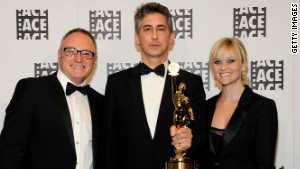
Indeed, aside from movie stars -- who have always been at the center of the Hollywood galaxy -- directors got all the glory in the traditional Tinseltown hierarchy. They were the "auteurs," in the term coined by the French critics of the 1950s. The writer was the butt of jokes, the powerless guy scribbling at the whim of everybody else: "There was an actress who was so dumb, she slept with the writer," goes the old one-liner.
The film editor, on the other hand, was the invisible man (or woman), sitting at the Moviola surrounded by clotheslines of celluloid clips, working behind the scenes to pull the story together.
To an extent, the renown of film people has changed. Though directors are still at the top of the ladder, writers, cinematographers and special-effects experts now have their own followings.
But editors? The technology is different -- it's digital now, done on computers equipped with powerful software -- but their names are still mostly unknown. When it's time to announce the editing winner at the Academy Awards, millions of people head for the refrigerator.
Their work is equally overlooked, often by design.
"In Hollywood, the classical style is to be invisible. Let the story unfold and not be something that's seen," says film editor Dan Lebental, who edited "Elf" and "Iron Man."
"We take whatever compliments we can get," adds Alan Baumgarten, who edited "Meet the Fockers" and "Zombieland." "But ... when we're fully engaged in the level of working creatively to make the best project we can, we know that there's that sense of trust and acceptance."
And yet editing is a cornerstone of film creation. Along with frame composition, it's key to how we understand a film, observes Dan Herbert, a film studies professor at the University of Michigan.
It's the editor who molds the dialogue rhythms, the scene flow, the story arc. Elements of film that have become part of the vernacular, such as cuts and dissolves, are employed to manipulate mood and emotion. Bad takes are discarded, but so are lines of dialogue, characters and whole scenes from the original screenplay, left on the fabled "cutting-room floor."
"If an editor cuts it out, (it) doesn't exist," says Herbert.
Editing can also be a tedious job, lasting several months, sometimes working alone, looking at scenes over and over and over again, trying to piece together the story.
"You have to like that solitude," says Richard Marks, a four-time Oscar nominee who taught Payne at UCLA. "Ultimately, that's what all good editors have in common. It gives you an incredible sense of control you don't have in real life."
Payne and Tent have been working together for more than 17 years. The two met when Payne was looking for an editor for "Citizen Ruth" (1996), his first major feature. He had just lined up financing and called an editor friend, Carole Kravetz, for a recommendation. She gave Payne two names. One was Tent's. The editor, whose experience at the time was mainly on low-budget Roger Corman-produced films, dropped off a tape of his work.
Right away, says Payne, "I had a good feeling with him."
They'd lived in the same part of L.A. and knew some of the same people, says Tent. "We were circling each other."
While the studio behind "Citizen Ruth" didn't want Tent, he says Payne "always liked the idea of me working for Roger."
"It's like a marriage"
Tent grew up near Buffalo, New York. His father was a salesman; his mother was housewife who raised five children. Kevin was the oldest. Tent didn't get the filmmaking bug until his late teens, when some friends bought a Super 8 camera. (Their production: "I Was a Teenage Rodent.")
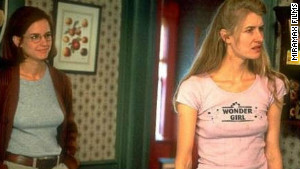
He studied broadcasting in college in central New York but dropped out after a couple years and hitchhiked to Los Angeles. Once there, he enrolled in some courses at Los Angeles City College and took a job making educational films.
The focus on editing was an accident. A friend had showed him the ropes in college, and Tent enjoyed the task so much, he often edited his friends' student films. During the course of a job search, he applied to work with Corman and was asked to recut a movie. The director of that production, Jim Wynorski, liked Tent's work and asked him to edit his next film.
Right away, Tent got a crash course in Hollywood moviemaking, Corman-style. The producer, the godfather of low-budget American cinema and the man who gave dozens of directors, writers and performers their starts, was known for cranking out films quickly and cheaply, often using stock footage from other movies. Tent's résumé includes such classics as "Not of This Earth" (former porn star Traci Lords' first mainstream acting role), "Hollywood Boulevard II," "Basket Case 2," "Rock 'n' Roll High School Forever" and the timeless "Frankenhooker." (The latter, Tent says, always earns excited eyebrow-raising comments from observers.)
It was around this time that Tent was led to Payne, and the pair's collaboration began. It's been a tight bond, which is often true of the best editors and directors, including Dede Allen and Arthur Penn (five films, including "Bonnie and Clyde") and Thelma Schoonmaker and Martin Scorsese (who have collaborated on every Scorsese film since 1980's "Raging Bull").
"It's like a marriage," says Richard Marks, who should know: He's edited all six of James L. Brooks' films, including "Terms of Endearment" and "Broadcast News."
The relationship can create incredibly powerful movie moments.
Consider the impact of one transition: the famed cut between the thrown bone and the space ship in Stanley Kubrick's "2001: A Space Odyssey," edited by Ray Lovejoy. In a split second, the audience is transported thousands of miles in space, millions of years in time, from the triumphant rage of the ape-man to the sterile wonder of the stars, "from an unknowable prehistory to an unknown future," says Herbert. "It doesn't require any description. It just happens visually."
Editing can also hide a host of sins. In production, "Jaws" suffered huge setbacks because of its balky mechanical sharks. Director Steven Spielberg and editor Verna Fields worked around the problem with the oldest trick in the horror-movie book: simply suggesting the appearance of the villain. Fields won an Oscar for her work (as did John Williams for his equally suggestive score).
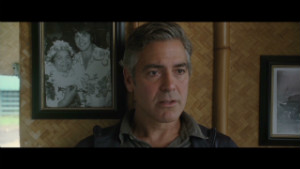 George Clooney in 'The Descendants'
George Clooney in 'The Descendants'
For "The Descendants," Tent faced a delicate task. The film concerns a Hawaiian landowner, played by George Clooney, whose comatose wife is in the hospital. Clooney's character, Matt King, has been something of an absentee father, and he has to cope with two rebellious daughters, the news of his wife's affair and a looming decision on selling his family's longtime acreage. As with Payne's other films, "The Descendants" has scenes of absurd comedy -- at one point, Clooney races around the block in flip-flops -- and weighty tragedy.
Like Payne, Tent generally believes that understatement should carry the day. One scene, in which Clooney gets rattled by a conversation with his cousin (Beau Bridges), originally featured an extensive montage of faces after a deliberately repeated shot of Clooney leaning back in a daze. All that was cut, observes Tent. In another scene, Clooney receives the news that his wife's condition is terminal. The setup is fairly basic: shot of Clooney, shot of the doctor, shot of both. But the way the shots are mingled, coupled with Clooney's strong performance, gives the scene an emotional heft it may not have had otherwise.
"Kevin's art lies in the genius of trusting human beings," says Dern.
Lebental says he was deeply impressed by Tent's work on "The Descendants."
"People play to one tone, generally. How do you do a movie that can seamlessly move across four tones? That is editing," he says. "To switch multiple times and have it be cohesive? That's a real act of magic."
Payne's films are often showcases for actors, but that doesn't mean Tent lets star power overtake the story.
"He has no patience for fat or excess of any kind," Payne said in a speech at ACE's recent Eddie Awards, where Tent won best editing, drama, for "The Descendants" and Payne won the Golden Eddie for filmmaker of the year. In one of his films, he noted, there was an actor who took a dramatically long time to deliver a line. Payne wanted to keep it; Tent nixed it.
"If that actor had really wanted us to use the line," Tent told Payne, "he would have delivered it in a timely fashion."
Small bets and "tie day"
The two keep their work relationship light. Payne can remember only two serious disagreements in all the years they've worked together, and both were resolved in good spirits. In one case, on "Election," Payne wanted a scene cut more slowly than Tent. The editor finally offered $50 to try it his way.
"I ended up settling at $75," Payne says. (Tent's version won.)
And then there was another scene in "Election," lasting all of about 20 seconds, in which Matthew Broderick's character has a small exchange with another teacher in the hall: "Hey, Jim, big day!" says the other teacher. "Oh, yeah, big day," replies Broderick's character.
"Kevin talked me out of it, and I've hated him for it ever since," says Payne, barely hiding his crocodile tears.
More typical are opportunities for fun. Tuesday is "tie day" in the editing room: All the men have to wear ties, and the women have to wear ties or pearls. Or there was the time Tent's son, Charlie, sat in the cutting room while Tent worked and Payne went over a crossword puzzle. Tent left the room to get his son some pizza. Upon his return, Charlie was sitting in the editing chair, sizing up a shot. Payne acted as if nothing were awry.
And when Payne and Tent returned from Italy after showing a cut of "The Descendants" to Clooney, they decided to take a train across the United States and work on the next edit on board.
Laura Dern says her challenging title character in "Citizen Ruth" -- an irresponsible pregnant woman who becomes the subject of a tug-of-war between pro-choice and anti-abortion partisans -- could have become a caricature if not for the support of the filmmakers.
"You really have to try things out because you're dealing with an extreme human being," she says. "And so it became a real process of developing the character and performance through editing, and they were so embracing of it." To this day, she says, the "Citizen Ruth" cast and crew remains close.
In fact, Payne has a close relationship with a core group of his collaborators -- they call themselves the "Aquarius Club" for their February birthdays -- and generally manages to steer clear of studio politics thanks to his status as a director with "final cut," which means he -- not the studio -- has final say over the released film. (It's a perk only the most successful or prestigious directors get.) But Tent has worked on films with other directors or as a studio hire, and it's given him a broad view of the process.
On "RV," he enjoyed director Barry Sonnenfeld's sense of humor and love of quick-fire pacing: "I think he's the funniest guy I've ever met." Other experiences, though less gratifying, still prompt optimistic assessments.
Tent spent four months on "The Golden Compass," for which he was hired to help bring the special effects-laden film to the finish line.
"It was extremely political, but in the end, it was a great experience for me," he says. He was particularly fascinated by the visual effects. "It changed how I edited, because you couldn't touch those (special effects) shots. It was a challenge, but it was a good experience."
Making sense of the story
Even an editor can only do so much, says Richard Marks, the "Broadcast News" editor.
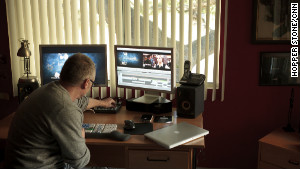
"You can make a good performance better, you can make maybe a bad performance mediocre, but you can't make a bad performance wonderful," he says.
An editor, he observes, is also the film's last chance. "A lot more eloquent people than I have said editing is the last rewriting process, and it is. Because you bring elements to it and can manipulate it in ways that weren't thought of in the inception."
Payne puts it more puckishly.
"Editing is the ongoing process of disguising how bad the film really is," he said in his ACE acceptance speech. "Every day we edit, we make the film suck less."
But it is, he adds, how we make sense of our stories.
Which brings us back to Tent's home office, where the editor tries to make sense of the stories Payne and others capture on film.
Each item in the room brings back a memory; each memory reveals a layer of his character. So perhaps the most telling object quietly dominates a corner next to the stern Mrs. Cohen: a sketch of Tent and Payne, arms around each other's shoulders, both dressed in white shirt and tie, looking like nothing so much as best buddies at a wedding.
Mrs. Cohen may follow Tent to his editing rooms, but she is, finally, invisible; what stands out are the good times and good work, particularly those with Payne.
Because what matters is what lives on. Asked to sum up what he does, Tent is appropriately succinct -- and deferential. He remembers something Payne's onetime cinematographer, the late James Glennon, once said.
"It's when you cut the bad stuff out."
Even Mrs. Cohen might have to smile at that.
